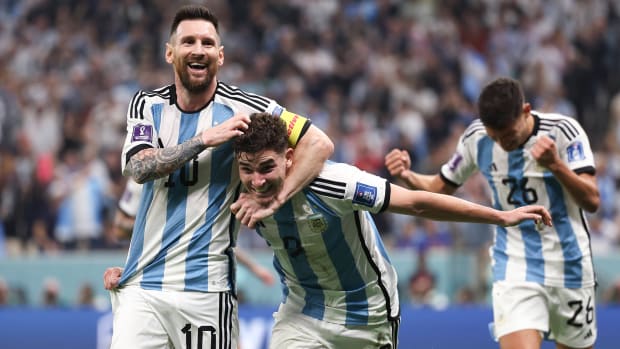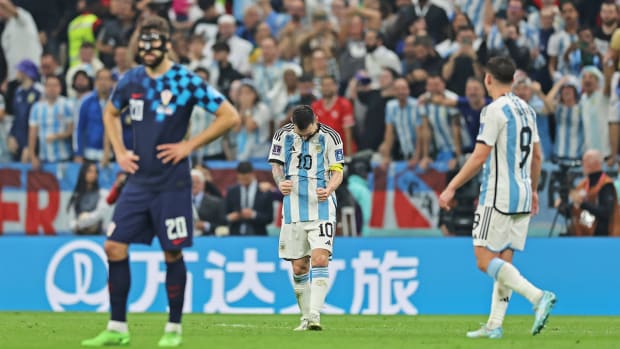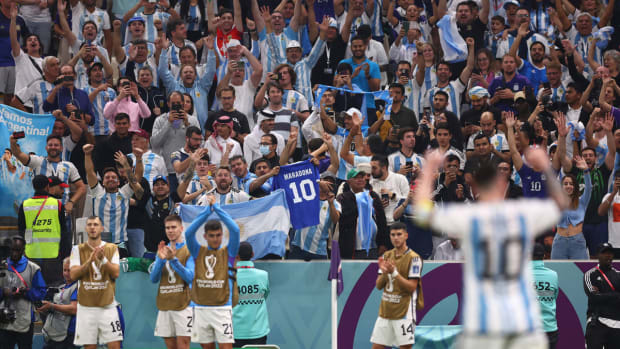LUSAIL, Qatar — Whereas Argentina icons Lionel Messi and Diego Maradona nimbly dribble(d) around and between opposing defenders, Julián Álvarez—so desperate to help the former, his beloved captain, win the World Cup—simply went through them.
Argentina is on its way deliriously to another final, and while this surely is Messi’s team, and in large part Messi’s story, the heir to Maradona has never been blessed with such a devoted and cohesive supporting cast. It’s a group he enjoys immensely, and it’s one that has turned over significantly since Argentina’s limp performance four years ago in Russia. That one-win failure felt like it might signal the end of Messi’s World Cup quest. But there’s a new guard now, led by the 22-year-old Álvarez, that’s robust and focused on contributing as much to the cause as their timeless leader.
On Tuesday night here at the Lusail Iconic Stadium north of Doha, Álvarez achieved what’s been so elusive for so many others—he broke Croatia. The Manchester City striker scored twice in Argentina’s commanding 3–0 semifinal win. He was quoted by Argentina’s El País over the summer insisting that “football owes” Messi a World Cup, “for everything he means to football worldwide.” So Álvarez did his part on behalf of football, drawing the penalty kick foul that keyed Messi’s opener, then putting Croatia away with an incredible goal toward the end of the first half.

Xu Zijian/Xinhua/Imago Images
The backbreaker started with a Croatia corner kick and led to a quick counter, with Álvarez picking up the ball on the run at midfield. Argentina right back Nahuel Molina, who was the target for Messi’s implausible through ball in the quarterfinal win over the Netherlands, once again provided some off-the-ball guile. The 24-year-old cut between the two remaining Croatian defenders and veered left, throwing them both off balance. Álvarez surged forward undeterred, recapturing the ball after it rebounded off Josip Juranović, then somehow finding it again after it was played by Borna Sosa. Álvarez was on a mission. He never broke stride, barreling forward and volleying a shot past the goalkeeper.
As the planet marveled, a video circulated featuring an 11-year-old Álvarez wearing the shirt of his youth team in his hometown near Córdoba.
“What’s your dream in football?” the off-camera interview asks.
“To play in a World Cup,” the younger Álvarez answers.
“Who’s your idol?” is the follow-up.
“Messi.”
Eleven years ago, Messi was already considered one of the greatest of all time. He was the electric focal point of a Barcelona side that many felt was the best they’d ever seen. He then dragged Argentina to the World Cup final in 2014 in Rio de Janeiro, but that was a side that labored toward the business end of that tournament, scoring only two goals in four knockout games. Messi was muzzled by Germany in the decider and his teammates failed to compensate.
Two years later, he’d famously announce his sudden retirement from international soccer following Argentina’s loss to Chile in the Copa América Centenario final. Representing his country and enduring defeat had become a demoralizing burden. He returned, of course, but the pressure he faced was described vividly by 2018 World Cup coach Jorge Sampaoli, who wrote that the World Cup “is like a revolver to Messi’s head.”

Xu Zijian/Xinhua/Imago Images
Now it’s all joy. La Albiceleste ended Messi’s international trophy drought in last year’s Copa América, and they’ll enter Sunday’s final against reigning champ France or upstart Morocco having lost just one of their past 42 matches (to Saudi Arabia, inexplicably, in the tournament opener). The veterans who fit have remained, while coach Lionel Scaloni has reseeded the team with young men who have the talent and temperament to complement Messi perfectly. Ten members of Scaloni’s team are more than 10 years younger than Messi, including regulars like Álvarez, Molina, Lautaro Martínez (25), Lisandro Martínez (24), Cristian Romero (24), Alexis Mac Allister (23) and Enzo Fernández (21).
“I can say that I feel very happy with this whole World Cup. I’m enjoying it a lot and luckily enough, I’m able to help my whole team to make this happen,” Messi said following the victory. “This is a very intelligent and wise team. We know how to read the game—how to read every moment.”
Argentina managed Croatia brilliantly, bending but not coming close to breaking as the brilliant Vatreni midfield of Mateo Kovačić, Marcelo Brozović and captain Luka Modrić dominated the ball in the first half hour. Argentina struck first, however, when Fernández sent a ball over the top and Álvarez was fouled by Croatia goalkeeper Dominik Livaković. Messi lashed home the subsequent penalty for his fifth goal of the tournament (Kylian Mbappé also has five).
Croatia had been beaten only once in its preceding 12 World Cup matches. It survived five that hit extra time and four shootouts. But it was the cunning and confidence of Argentina’s youth, and the endless energy and fire of its aging icon, that finally proved too much.
“They have a well-balanced team,” Croatia coach Zlatko Dalić acknowledged.
Argentina went to five in the back, Croatia tried to salvage one more unexpected result, and then Messi showed again why he’s everyone’s idol, and why just about every neutral on the planet will be hoping he lifts the trophy this weekend. Croatia center back Joško Gvardiol was one of the emerging stars of this World Cup, but Messi sensationally screwed him into the turf twice before cutting back a cross for Álvarez to finish from close range. It was his seventh goal in just 18 Argentina appearances, and it was a fitting capstone to the night—Messi remains uniquely brilliant, and he has teammates he can count on.

David Klein/Sportimage/Imago Images
“It’s such an honor to be leading this squad,” Scaloni said. “They make everything so much easier.”
Argentina’s response to that Saudi Arabia loss was telling. It didn’t fold or fracture. Players retained faith in the coaching staff, and Messi retained faith in his teammates.
“To start in such a way in a World Cup was a really hard blow,” Messi said. “It was an acid test for the whole squad, but then this squad proved how strong we are and then we won the other matches. What we did was very difficult, because every match was a final and this has involved a mental load.
“Internally we were confident that we would make it because we know what we’re capable of as a team,” he continued. “From then on, that really helped us to get stronger and grow even more into this tournament.”
Spain’s 2010 side, featuring a bunch of Messi’s Barcelona teammates, is the only World Cup champion to start with a defeat. Argentina is now on the threshold of joining them as a complete, championship-ready unit. It's driven and inspired by the best player in the world and he, in turn, is able to lead and perform at his best surrounded by teammates he likes and trusts. This is the formula the country has been waiting for.
“I try not to be too emotional. It is very difficult to put this into words,” Scaloni said. “This is what I’ve always dreamed of as an Argentine.”
Most of the Argentina bench was on its feet in stoppage time, jumping in unison with the tens of thousands of blue-and-white-clad fans at Lusail, singing and making that famous, snapping arm-waving gesture that’s urged players forward for generations. They’ve been moving in the same direction, frictionless, united behind their talisman. Messi will get his chance. He, and they, are five days and 90 minutes away.







